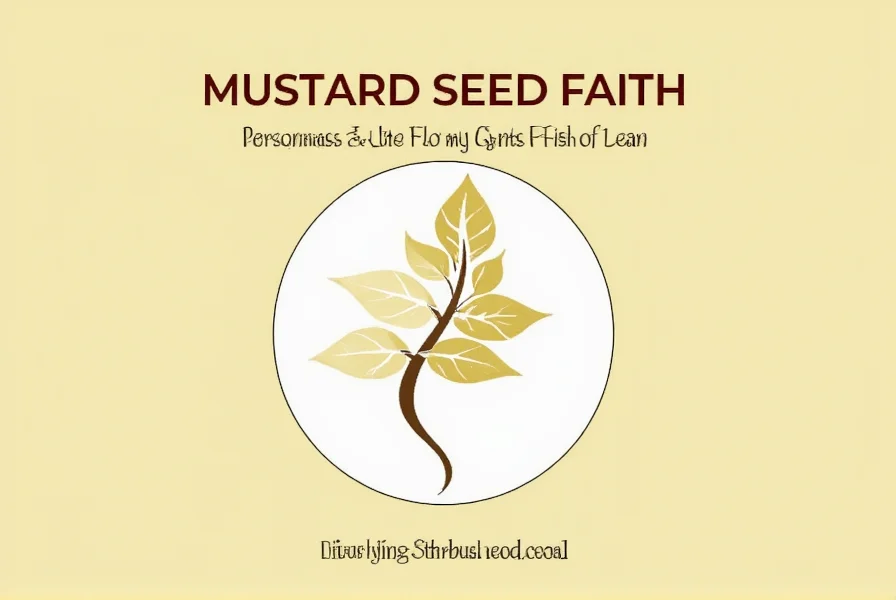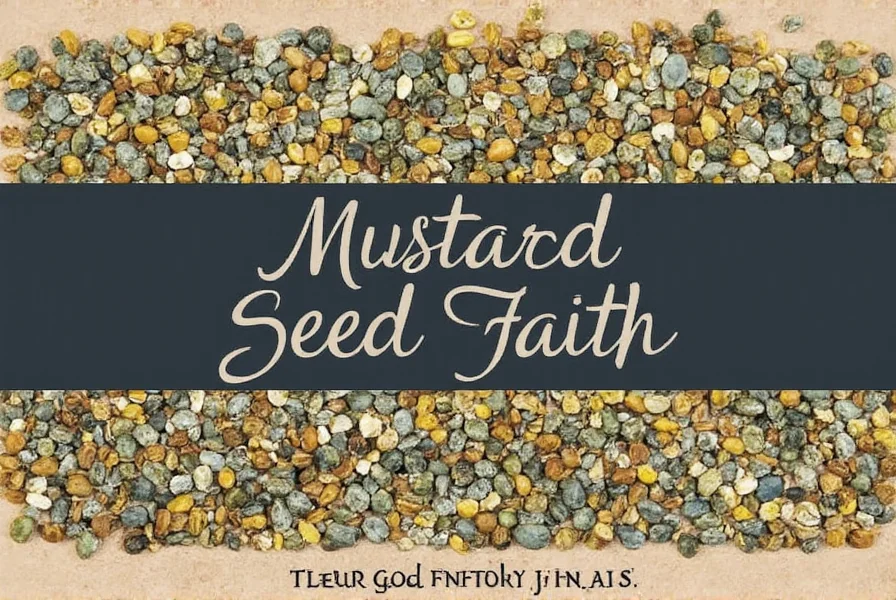The phrase \"mustard seed faith\" originates from one of Jesus' most profound teachings in the New Testament. When his disciples failed to heal a demon-possessed boy, they asked why they couldn't cast out the spirit. Jesus responded: \"Because you have so little faith. Truly I tell you, if you have faith as small as a mustard seed, you can say to this mountain, 'Move from here to there,' and it will move. Nothing will be impossible for you\" (Matthew 17:20). This teaching wasn't about measuring faith quantitatively but revealing its qualitative nature.
Biblical Context of the Mustard Seed Teaching
In first-century Palestine, the mustard seed represented the smallest of seeds yet grew into a substantial plant. Jesus frequently used agricultural metaphors his audience understood. The mustard plant could reach 6-10 feet tall, making the contrast between its tiny seed and large outcome striking. This parable appears in three Gospel accounts (Matthew 17:20, Matthew 13:31-32, Luke 17:6), each highlighting different aspects of faith's potential.
| Gospel Account | Context | Key Emphasis |
|---|---|---|
| Matthew 17:20 | After disciples failed to heal boy | Faith overcomes obstacles |
| Matthew 13:31-32 | Parable of Kingdom growth | Small beginnings, significant impact |
| Luke 17:6 | Teaching on forgiveness | Faith enables impossible obedience |
Theological Interpretation Beyond Literal Meaning
Understanding mustard seed faith requires recognizing Jesus wasn't prescribing a specific faith measurement. The teaching counters the disciples' assumption that more faith equals more power. Instead, authentic mustard seed faith represents:
- Complete dependence on God rather than self-reliance
- Authentic trust in God's character and promises
- Active obedience that acts on belief
- Quality over quantity - a small but genuine faith versus large but superficial belief
Many biblical scholars note that Jesus used the mustard seed not because of its small size alone, but because of its aggressive growth pattern. The mustard plant was considered a weed in Jewish agriculture - unstoppable once established. This metaphor suggests genuine faith, however small its beginnings, will inevitably grow and produce results.
Practical Application in Modern Life
For contemporary believers seeking to understand mustard seed faith practical application, the teaching offers several actionable insights. When facing seemingly insurmountable challenges, mustard seed faith christian teaching reminds us that:
True spiritual transformation begins with acknowledging our limitations while trusting God's unlimited power. The disciples' failure wasn't due to insufficient faith quantity but misplaced faith focus - they relied on their own ability rather than God's power. Modern applications include:
- Praying with confidence rather than doubt when facing health crises
- Trusting God's provision during financial uncertainty
- Believing change is possible in broken relationships
- Expecting breakthrough in seemingly hopeless situations
Common Misconceptions About Mustard Seed Faith
Several misunderstandings about mustard seed faith biblical interpretation persist. Some treat it as a spiritual formula: \"Say the right words with enough faith, and God must comply.\" This misrepresents Jesus' teaching, which emphasized relationship over ritual. Genuine mustard seed faith isn't:
- A force we manipulate rather than trust
- Measured by emotional intensity
- Guaranteed to produce immediate visible results
- Dependent on our performance
Understanding Jesus' mustard seed teaching requires recognizing it as an invitation to participate in God's work, not a technique to control outcomes. The mountain-moving power comes from God, activated through authentic trust.
Cultivating Authentic Mustard Seed Faith
Developing mustard seed faith practical application begins with small, consistent steps of trust. Biblical figures like Abraham didn't start with mountain-moving faith but grew through obedience in small matters. Practical ways to nurture this faith include:
- Start with God's character - Study biblical accounts of God's faithfulness
- Practice small obediences - Act on God's prompting in manageable ways
- Remember past faithfulness - Document God's work in your life
- Engage with community - Share struggles and victories with fellow believers
- Embrace honest doubt - Bring questions to God rather than suppressing them
The journey of how to develop mustard seed faith mirrors the mustard plant's growth - starting small but becoming substantial through consistent nourishment. As theologian John Ortberg observed, \"Faith is spelled R-I-S-K.\" Authentic mustard seed faith involves risk-taking trust in a trustworthy God.

Real-Life Examples of Mustard Seed Faith
History and contemporary experience provide compelling examples of mustard seed faith real life applications. Corrie ten Boom and her family hid Jews during WWII with what seemed like insufficient resources, yet their small act of faith saved hundreds. Modern examples include:
- Medical professionals trusting God amid impossible cases
- Refugees rebuilding lives with nothing but hope
- Communities restoring broken neighborhoods through persistent effort
- Individuals overcoming addiction through daily surrender
These examples demonstrate the meaning of mustard seed faith in the bible isn't about dramatic displays but consistent, trusting action. The power resides not in the faith itself but in the faithful God who responds to genuine trust.
Conclusion: The Enduring Power of Small Faith
Mustard seed faith represents one of Christianity's most liberating teachings - God doesn't require perfect faith but authentic trust. The biblical interpretation of mustard seed parable reveals that genuine faith, however small, connects us to divine power. This understanding transforms how believers approach challenges, recognizing that:
- God works through available faith, not perfect faith
- Authentic trust grows through use
- Small beginnings honor God's sovereignty
- True faith focuses on God's character, not circumstances
As you consider your own journey with mustard seed faith, remember that the smallest seed of trust, when rooted in the right soil, produces extraordinary growth. The mountain-moving power never resided in the seed itself but in the divine potential activated through genuine belief.
Frequently Asked Questions
What does mustard seed faith actually mean in biblical context?
Mustard seed faith refers to Jesus' teaching that even faith as small as a mustard seed can move mountains. It emphasizes that the quality and authenticity of faith matters more than its perceived quantity. Genuine trust in God, however small it may seem, connects believers to divine power and produces transformative results.
How can I develop mustard seed faith in difficult circumstances?
Begin with small, consistent steps of trust: focus on God's character through Scripture, practice obedience in manageable areas, document God's faithfulness, engage with supportive believers, and bring doubts honestly to God. Authentic faith grows through use, so start with whatever level of trust you currently have rather than waiting for 'more' faith.
Does mustard seed faith guarantee that prayers will be answered as desired?
No, mustard seed faith doesn't guarantee specific outcomes. The teaching emphasizes trust in God's character rather than a formula for results. Genuine faith aligns with God's will, and the 'mountain-moving' power comes from God through authentic trust, but outcomes remain subject to God's wisdom and purposes.
What's the difference between mustard seed faith and positive thinking?
Mustard seed faith centers on trust in God's character and promises, acknowledging human limitation and depending on divine power. Positive thinking focuses on human ability to influence outcomes through mindset. The biblical concept is about relationship with God rather than psychological technique.
Why did Jesus use a mustard seed as his example for faith?
Jesus used the mustard seed because it represented the smallest seed in Palestinian agriculture yet grew into a substantial plant (6-10 feet tall). The mustard plant was considered a weed - unstoppable once established. This metaphor illustrates how genuine faith, however small its beginnings, will inevitably grow and produce significant results when rooted in God.











 浙公网安备
33010002000092号
浙公网安备
33010002000092号 浙B2-20120091-4
浙B2-20120091-4